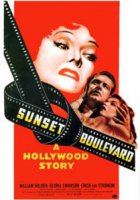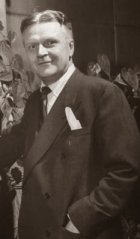
Sunset Boulevard Page #5
- NOT RATED
- Year:
- 1950
- 110 min
- 1,883 Views
shoots past the driveway, still looking for Gillis.
A-25 GILLIS
He watches his pursuers GILLIS' VOICE
shoot past and out of Yeah...
sight. He opens the
door and looks down at I had landed myself in the
the flat tire. Then he driveway of some big mansion
looks around to see that looked run-down and
where he is. deserted. At the end of the
drive was a lovely sight
A-26 DRIVEWAY WITH GARAGE indeed -- a great big empty
garage, just standing there
An enormous, five-car going to waste. If ever there
affair. neglected and was a place to stash away a
empty-looking. limping car with a hot license
number...
A-27 GILLIS
He gets back into his There was another occupant in
car and carefully pilots that garage: an enormous
the limping vehicle into foreign-built automobile. It
one of the stalls. In must have burned up ten gallons
the adjoining one is a to a mile. It had a 1932
large, dust-covered license. I figured that's
Isotta-Fraschini propped when the owners moved out...
up on blocks. He closes I also figured I couldn't go
the garage door and walks back to my apartment now that
up the driveway. In idle those bloodhounds were on to
curiosity he mounts a me. The idea was to get Artie
stone staircase which Green's and stay there till I
leads to the garden. could make that bus for Ohio.
CAMERA IN BACK OF HIM. Once back in Dayton I'd drop
At the top of the steps the credit boys a picturepost-
he sees the somber pile card telling them where to
of pick up the jallopy.
NORMA DESMOND'S HOUSE GILLIS' VOICE
It is a grandiose -- It was a great big white
Italianate structure, elephant of a place. The kind
mottled by the years, crazy movie people built in the
gloomy, forsaken, crazy Twenties. A neglected
little formal garden house gets an unhappy look.
completely gone to This one had it in spades. It
seed. was like that old woman in
Great Expectations -- that Miss
From somewhere above Haversham in her rotting wed-
comes ding dress and her torn veil,
taking it out on the world be-
cause she'd been given the go-
by.
A WOMAN'S VOICE
You there!
Gillls turns and looks.
A-28 UPSTAIRS LOGGIA
Behind a bamboo blind there is a movement of
a dark figure.
WOMAN'S VOICE
Wlly are you so late? Why have
you kept me waitlng so long?
A-29 GILLIS
He stands flabbergasted. A new noise attracts his
attention -- the creak of a heavy metal-and-glass
door being opened. He turns and sees
A-3O THE ENTRANCE DOOR OF THE HOUSE
Max von Mayerling stands there. He is sixty, and
all in black, except for immaculate white cotton
gloves, shirt, high, stiff collar and a white bow
tie. His coat is shiny black alpaca, his trousers
ledger-atriped. He is semi-paralyzed. The left
side of his mouth is pulled down, and he leans on a
rubber-ferruled stick.
MAX:
In here!
Gillis enters the shot.
GILLIS:
I just put my car in the garage.
I had a blow-out. I thought --
MAX:
Go on in.
There is authority in the gesture of his white-
gloved hand as he motions Gillis inside.
GILLIS:
Look, maybe I'd better take my
car --
MAX:
Wipe your feet!
Automatically, Gillis wipes his feet on an enormous
shabby cocoanut mat.
MAX:
You are not dressed properly.
GILLIS:
Dressed for what?
THE WOMAN'S VOICE
Max! Have him come up, Max!
MAX:
(Gesturing)
Up the stairs!
GILLIS:
Suppose you listen just for a
minute -
MAX:
Madame is waiting.
GILLIS:
For me? Okay.
Gillis enters.
A-31 INT. NORMA DESMOND'S ENTRANCE HALL
It is grandiose and grim. The whole place is one of
those abortions of silent-picture days, with bowling
alleys in the cellar and a built-in pipe organ, and
beams imported from Italy, with California termites
at work on them. Portieres are drawn before all the
windows, and only thin slits or sunlight find their
way in to fight the few electric bulbs which are always
burning.
Gillis starts up the curve of the black marble
staircase. It has a wrought-iron rail and a worn
velvet rope along the wall.
MAX:
(From below)
If you need help with the
coffin call me.
The oddity of the situation has caught Gillis'
imagination. He climbs the stairs with a kind of
morbid fascination. At the top he stops, undecided,
then turns to the right and is stopped by
WOMAN'S VOICE
This way!
Gillis swings around.
Norma Desmond stands down the corridor next to a
doorway from which emerges a flickering light. She
is a little woman. There is a curious style, a
great sense of high voltage about her. She is dress-
ed in black house pyjamas and black high-heeled
pumps. Around her throat there is a leopard-pat-
terned scarf, and wound around her head a turban of
the same material. Her skin is very pale, and she
is wearing dark glasses.
NORMA:
In here. I put him on my massage
table in front of the fire. He
always liked fires and poking at
them with a stick.
Translation
Translate and read this script in other languages:
Select another language:
- - Select -
- 简体中文 (Chinese - Simplified)
- 繁體中文 (Chinese - Traditional)
- Español (Spanish)
- Esperanto (Esperanto)
- 日本語 (Japanese)
- Português (Portuguese)
- Deutsch (German)
- العربية (Arabic)
- Français (French)
- Русский (Russian)
- ಕನ್ನಡ (Kannada)
- 한국어 (Korean)
- עברית (Hebrew)
- Gaeilge (Irish)
- Українська (Ukrainian)
- اردو (Urdu)
- Magyar (Hungarian)
- मानक हिन्दी (Hindi)
- Indonesia (Indonesian)
- Italiano (Italian)
- தமிழ் (Tamil)
- Türkçe (Turkish)
- తెలుగు (Telugu)
- ภาษาไทย (Thai)
- Tiếng Việt (Vietnamese)
- Čeština (Czech)
- Polski (Polish)
- Bahasa Indonesia (Indonesian)
- Românește (Romanian)
- Nederlands (Dutch)
- Ελληνικά (Greek)
- Latinum (Latin)
- Svenska (Swedish)
- Dansk (Danish)
- Suomi (Finnish)
- فارسی (Persian)
- ייִדיש (Yiddish)
- հայերեն (Armenian)
- Norsk (Norwegian)
- English (English)
Citation
Use the citation below to add this screenplay to your bibliography:
Style:MLAChicagoAPA
"Sunset Boulevard" Scripts.com. STANDS4 LLC, 2025. Web. 23 Feb. 2025. <https://www.scripts.com/script/sunset_boulevard_993>.







Discuss this script with the community:
Report Comment
We're doing our best to make sure our content is useful, accurate and safe.
If by any chance you spot an inappropriate comment while navigating through our website please use this form to let us know, and we'll take care of it shortly.
Attachment
You need to be logged in to favorite.
Log In